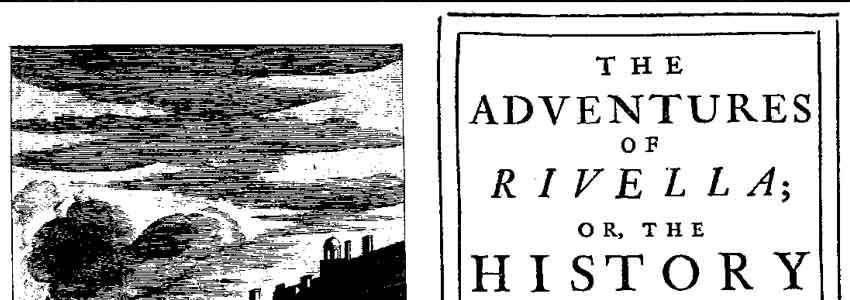Delarivier Manley and the Advantage of Using a Man’s Voice
Manley Uses Manly Voices to Further Her Cause
By Alexandra Rosen
The Adventures of Rivella is a book confusing in nature by the author’s proto-modern play with genre and form. Delarivier Manley manipulates her publisher’s intended genre of autobiography by making this a tale narrated about herself, revealing not only her acceptance of her transgressions, but she also uses the trope of the unrequited lover to do something very special. It becomes fictive autobiography because she uses a Sir Charles Lovemore, a presumably fictional character (though possibly based someone Manley did know) to tell her life story to the Chevalier D’Aumont.
Manley may be relating the events of her life, but at the time she did not reveal the fact that she was the author. She claimed as it were, on the title page, that it was a translation from the French, which we know to be a classic misdirection (39-40. This is the reader’s first signal that Manley is not going to be telling the whole truth, as translations never carry over the exact meaning; there is always something lost in translation. Her doing this also allows her to say outrageous things about “Rivella” because perhaps the British people would expect that type of shock from the French people.
Manley also uses Lovemore to narrate her tale because, as an unrequited lover, he had even more reason to say slanderous things about Rivella. Therefore, her readers would possibly be inspired to feel as Chevalier D’Aumont does, that Lovemore has made the story of Rivella’s life a hyperbolic tale of wretched behavior that he tried to stem. He gives the accounts of her misadventures and ends each vignette with a scene of him trying to save Rivella from the fate she has brought upon herself. He sounds chivalric enough trying to spirit her off to “France, where the Queen…would doubtless take her into her own protection” or to “Switzerland, or any country that was but a place of safety” (109). Though he is trying to come out the hero in the telling, he serves only to make Rivella seem a heroine. In this way, Lovemore mistakenly makes Rivella look like she may not be as bad as he knows her to be, just because he is jealous of the attentions other men received from his cherished Rivella that he never would.
Manley also makes use of two different forms of dialogue, which complicate the narrative by making this story entangled in itself for the reader who depends upon visual cues to know who is speaking. She uses the dialogue between Chevalier D’Aumont and Sir Lovemore to form the base of her proto-modern book. The majority of the book is simply Sir Lovemore narrating Rivella’s story to D’Aumont, but occasionally, he breaks up his monologue with metanarrative interruptions such as “I will not tire you with many more particulars” (99). I think that Manley used this is a device to add intrigue to the story of Rivella. Just the fact that there are many more particulars keeps the Chevalier more interested in the tale, wondering what the left out details might be. Moreover, because the Chevalier is left to wonder these details, the reader is left feeling expected to consider what they might be missing in these apparent minutias, as well.
Manley uses deflections that take away from the negative light that she might be considered in from a plain, straightforward memoir or history/autobiography. She makes it seem as unbiased as possible from her own standpoint, while using Lovemore and D’Aumont to wield their biases for her. Because D’Aumont is indeed infatuated with her from the start—though “her perfections are not of the sort that inspire immediate delight” (44)—and his desire to meet her lasts through all the defamation of character that she endures at the mouth of their mutual friend Lovemore. His French sensibilities apparently make her imperfections her best parts; “it would have been a fault in her, not to have been faulty” (114).


